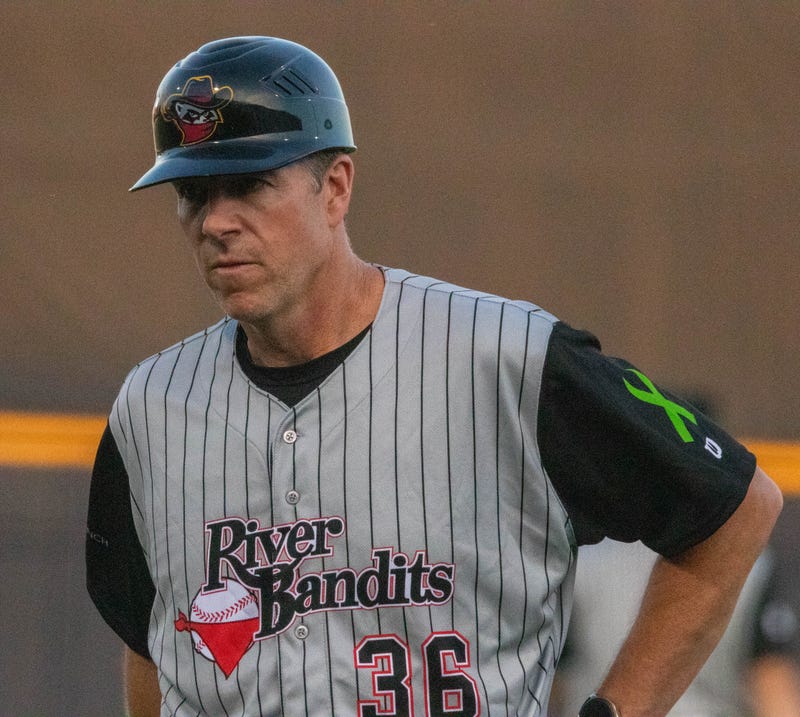
PHILADELPHIA (KYW Newsradio) — Chris Widger is a Pennsville, New Jersey native who spent ten years in the Major Leagues as a catcher.
He was drafted by the Seattle Mariners in the third round of the MLB Draft in 1992. Widger ultimately played for six different teams in the big leagues, including the Chicago White Sox, where he helped win the 2005 World Series.

These days, Widger is a minor league manager and was named Baseball America's Minor League Manager of the Year following the 2021 season, after leading the High-A Quad Cities River Bandits in the Kansas City Royals system to a championship. In 2022, he will manage the Royals' Double-A squad in Northwest Arkansas.
Widger stopped by the KYW Newsradio original podcast "1-on-1 with Matt Leon" to talk about his life in baseball, looking back at his career as player and talking about his success as a manager.
You can listen to the full conversation above. The following is a lightly edited excerpt of the conversation.
Matt Leon: When did it start to crystallize that baseball was going to be a path for you?
Chris Widger: It was always a dream. My mom before she passed, I'll tell everybody that when I was six years old that I told her that I was going to buy her a red Corvette when I made the major leagues. That never happened. (laughs)
But it was something that I kind of always dreamed up, because that's what you see on TV. You know, I wasn't going to be a professional wrestler kind of thing. And so my dream always was to become a professional baseball player.
I don't think I ever realized it was going to happen until probably going into my junior year of college, because I wasn't highly recruited. I wasn't the best player in the state. I wasn't known across the country. So the progression happened and I happened to play well enough at the right time for some people to see me.
You were mainly a catcher in the big leagues. Were you always a catcher growing up? Or did you kind of move around?
Off and on but again, I think that starts with my dad. He said you're going to learn how to play all the positions. He knew that my best position was catching and but I was too lazy to retake catcher. I didn't want to do the catching because the catching wasn't fun. You know, the pitchers are the ones that had fun in the outfield, you know, so I did everything but catch every day. I had always done a little bit.
And then finally, my junior year of high school, Ed Rieger, longtime coach here at Pennsville, told me that if you wanted a chance to play in college that you need to switch over and be a full-time catcher. And so that's when it happened.
How did that go down with you? I mean, obviously, you like the opportunity but catching's hard. Not for nothing, the equipment itself is just the pain inning after inning after inning. So when you see that as the path, you know, how'd that sit with you?
My dad had been saying it for a long time, that that's where I should have been. But you know, your parents don't know anything when you're growing up. So I kind of resisted a little bit. And again, because outfield, pitching, first base, they were easy compared to catching. When I finally made the decision, when I heard that from Mr. Rieger and also from Coach Strong who who took over for him, then it started to make sense.
You know, I didn't hit for a lot of power coming up early in my high school career. I wasn't that fast. So if you take those things out of the equation — you're not that fast, you're not going to play the outfield and you don't hit for a lot of power — you're not going to play first base.
I could throw, that was definitely one thing that had developed for me. And I was athletic for a catcher. So once I started to do it, I grew into it. And it was an easy transition.
What was your favorite part of catching during those formative years, you know, late high school, college — what came to be the part you really loved about the position?
Being in control the game, being a part of the game on every pitch, working with the pitchers. I probably got as much satisfaction out of catching a shutout as I did hitting home runs or getting hits, because it was a lot of fun, especially when your pitcher came off the field and he appreciated what you did for him and you work really well. So that part of it is what I liked.
You know, baseball is a boring sport by nature. There's a lot of standing around. And the more I caught, the more I thought, "Man, this is a lot better than standing in the outfield, maybe not even having a play but every two or three innings."
And just being in control of the game, controlling the pace of the game, working with the umpires trying to get extra strikes, all the little things of the game that people I guess probably don't pay attention to much — that was the part I like the most.
For more "1-on-1 with Matt Leon," subscribe on the Audacy app or wherever you get your podcasts.

